Refugee Week 2024: Finding Freedom, Family
This week is Refugee Week (Sunday 16 June to Saturday 22 June). Its theme, ‘Finding Freedom: Family’ encapsulates the resilience, strength, and unity that defines the refugee experience, and emphasises the crucial role families play in providing solace, support, and a sense of belonging to those forced to flee their homelands. We spoke to two families attending Navitas Skilled Futures in NSW’s refugee heartland of Fairfield, to hear how important being together has been for their successful settlement journeys.
THE YEROMINA FAMILY – UKRAINE
In March 2022, after weeks of terror, living in and out of bomb shelters, Olena and her teenage daughter, Yekatierina, fled Ukraine for Poland on a small minibus, with the help of a local church group. She remembers looking out the window and seeing rockets flying overhead, and being so scared she “couldn’t even swallow”. They were reunited with Olena’s Australian husband in Poland, who had been working in Latvia when Russia invaded Ukraine.
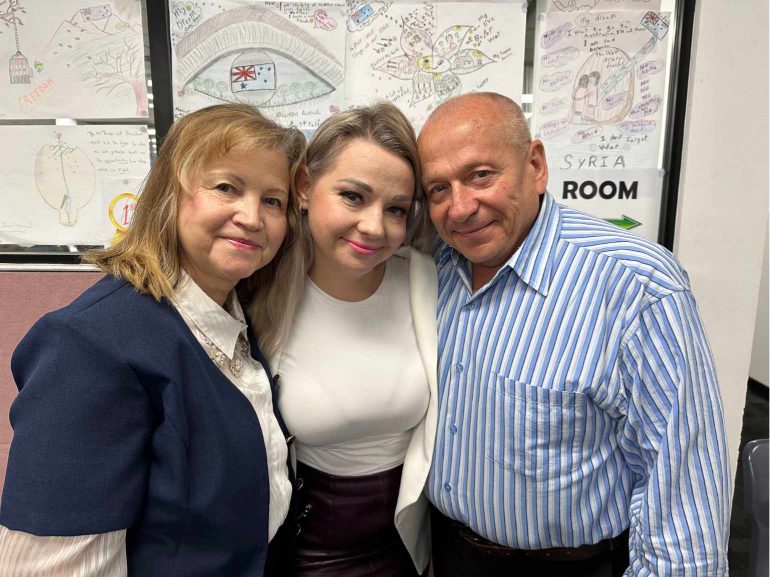
With only a travel bag of a few possessions, Olena needed to buy some clothes, but in the middle of the store she burst into tears.
“I felt like half of my soul was empty because my parents were not with me,” she recalls. “And now I’m in safety, in a shop buying a dress, sweater, jeans for me. And they are not with me; they are in danger, and they can die from bombs. I cry and my husband tries to calm me down but I don’t want to lose my parents. I don’t want a life without them.”
“We didn’t come here with nothing because we came here with our lives, and we came here together, and that is the most important thing,”
Olena, AMEP Fairfield
The trio travelled to Latvia, where Yekatierina called her grandparents and convinced them to leave Ukraine, and Olena’s husband helped to apply for a humanitarian visa for her parents, so the whole family could come to Australia. When they all arrived together in May 2022, it was with mixed emotions – they were happy and grateful to be in a safe beautiful country but also sad to leave everything they knew in a war zone, including extended family and friends.
Her father Oleksandr agrees: “I love my daughter, my granddaughter. I love my wife. In Ukraine, my wife very nervous every day, there is bombs, there is war, people dead. I want to protect my wife, my family.”
While Olena lives separately to her parents, the family spends a lot of time together, including at the Navitas Skilled Futures Fairfield College (NSF), where they are learning English as part of the Australian Government-funded Adult Migrant English Program (AMEP). Yekatierina is in Year 11 at a nearby high school and doing well, having recently received a leadership award.
His wife, Kateryna, said they didn’t know any English before coming to Australia. “At school I learned German, and my husband learned French,” she says. “We have been learning English for two years in Navitas. We understand people in the store, pharmacy, on the street, English books, television and life in Australia. We are happy that our daughter is learning English and our granddaughter is studying in college.”
“What I love about Australia, government help me. Very friendly people, very good medicine in Australia, I study in Navitas, I study new language, my brain work every day. English language very hard.”
Oleksandr, AMEP Fairfield
Oleksandr, who was a teacher’s assistant in Ukraine, would like to work as a truck driver in Australia once his English improves. Kateryna, an art teacher, hopes to work in childcare. Olena was also an art teacher in Ukraine, and has continued to create art in Australia. Her mother also attends a weekly painting class in Parramatta, run by STARTTS (NSW Service for the Treatment and Rehabilitation of Torture and Trauma Survivors) as a social opportunity to connect with others.
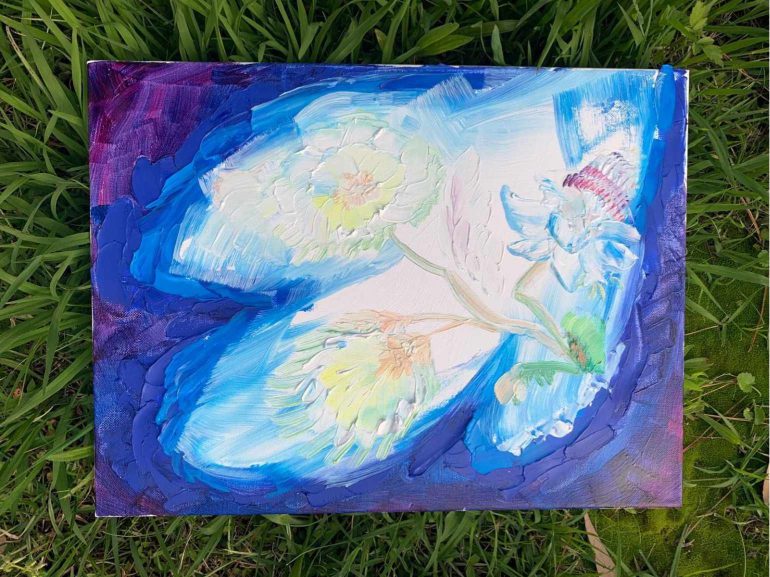
Painting by Olena of ‘Tree of Life’ a traditional Ukrainian symbol denoting the unity of generations
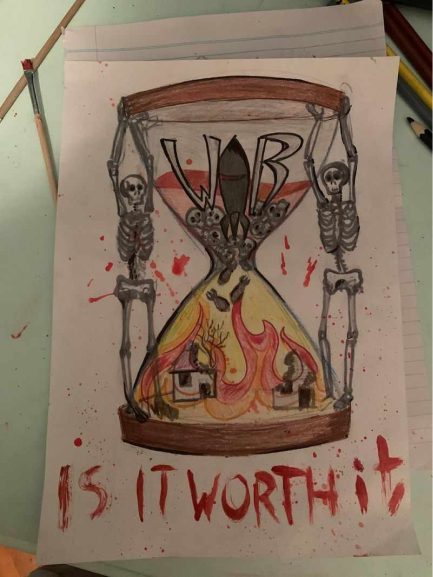
Art from Olena’s daughter,
depicting war
Oleksandr loves the outdoors and gardening, and grows vegetables and herbs in his backyard, including cucumbers, tomatoes, beetroot, and zucchini. It reminds his wife Kateryna of her parents, who also liked to grow vegetables in Ukraine.
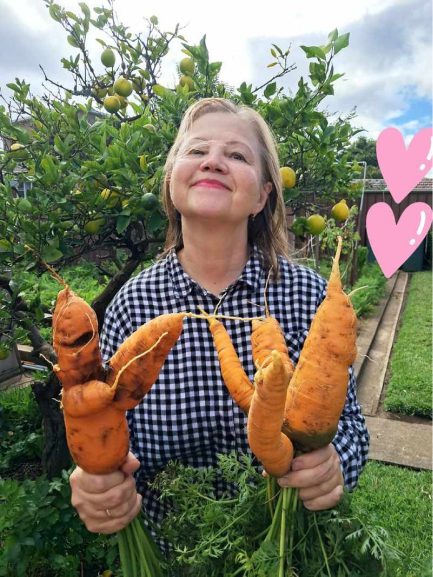
“Ukrainians love gardening,” she says, showing off a photo of her enormous homegrown carrots. “In Australia life is good. We are very happy here.”
THE QUZILEHIL FAMILY
For Abdul, Khalool and their daughter Mowarid, their recent journey to Australia was bittersweet. While it meant they could be reunited with their other daughter, who has lived in Australia for 10 years, their three sons remain on the other side of the world, including one as a refugee in Pakistan, who Khalool worries about every day.
“When Taliban took over in Afghanistan, we left in a hurry,” Khalool said through a translator. Abdul was a retired army worker, and with their son also working in the Army, their life was in danger.
“We had no problems before Taliban,” Khalool said. “I was school teacher and living happy. When Taliban came I had been cooking and we left everything on the stove because it was an emergency. We were scared and we had to leave Afghanistan while the borders were still open.”
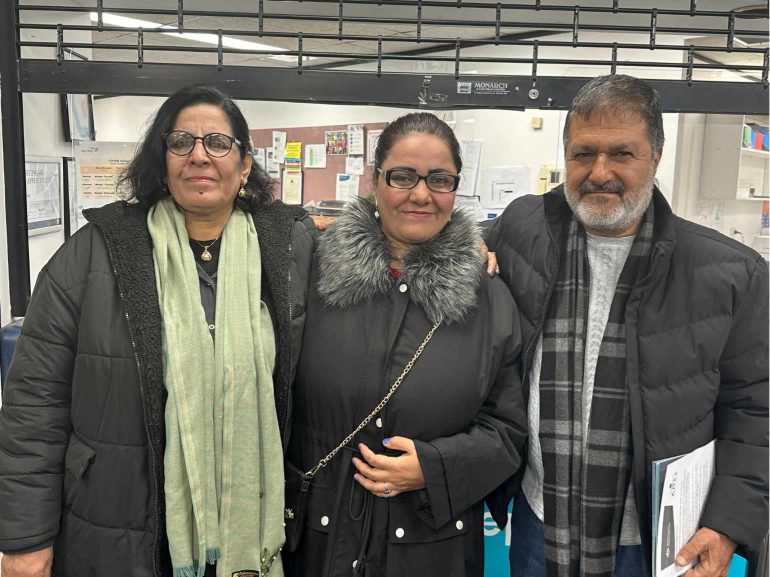
The family travelled to Pakistan, where they lived for two-and-a-half years while their daughter, married with four children to an Australian, helped apply for their visas to come to Sydney.
While Abdul, Khalool and Mowarid were successful in gaining visas, they had to leave one son behind in Pakistan. Unable to return to Afghanistan and unable to get a visa, Khalool worries about him every day. Two other sons were already living in Germany, one as a professional soccer player, and another son lives in Melbourne.
“We are happy because we are here in Australia but I’m sad and upset to leave my son” she said.
They arrived in January this year, after a nervous trip through Dubai. Khalool said they had lost their appetite from worry about the journey and hadn’t eaten for days, but as soon as they got on the plane in Dubai and knew the next stop was Sydney they could finally relax.
“When I was on the airplane I was crying because of happiness. The airplane gave us some food and we are all safe now, we can finally eat now. When we got to Australia it was the most pleasant feeling because finally we reach a country that is a good country and we are safe.”
Khalool, AMEP Fairfield
The family is living in Guildford and is learning English in the AMEP at NSF Fairfield. They are all in the same class. They are also enrolled in an English for Driving course at the college on Fridays, with the aim of getting their license.
Abdul admits he is the best at learning English, in the family, and the class. He is highly motivated to improve his language skills, to learn to drive and to work.
“We all study in the same class and sit next to each other,” he said. “We have learned a lot and try to learn, and we help each other. At home we study and practise as well, using my mobile phone. We do everything together, at college and outside. When one of us goes somewhere we all go and we are very happy.”
“We all study in the same class and sit next to each other. We have learned a lot and try to learn, and we help each other. At home we study and practise as well, using my mobile phone. We do everything together, at college and outside. When one of us goes somewhere we all go and we are very happy.”
Abdul, AMEP Fairfield
Khalool said the family is so grateful to be in Australia; the government is very supportive and people are very kind. But she is torn.
“My mind is on my son in Pakistan because I am always thinking about him so I find it hard to concentrate,” she said. “I am hoping he will be here one day and we can be together again.”
IMPORTANCE OF FAMILY
NSF Stakeholder Engagement Manager, Basim Shamaon, understands better than most the importance of family when settling in a new land. As a teenage refugee from Iraq, it was the one constant for him at a time when everything else was so unfamiliar – the language, the environment and the way of life. As the eldest sibling in his family of six, he said his parents relied on him a lot until they gained language skills, confidence and independence.
“Family is so important to refugees, it cannot be underestimated,” Basim said. “Because they’ve already been through so much trauma. They’ve already seen so many events in front of them – killing, bombings, all these terrible things that no one wants to see, so to have their family with them is great support and security.”
“Family is so important to refugees, it cannot be underestimated,” Basim said. “Because they’ve already been through so much trauma. They’ve already seen so many events in front of them – killing, bombings, all these terrible things that no one wants to see, so to have their family with them is great support and security.”
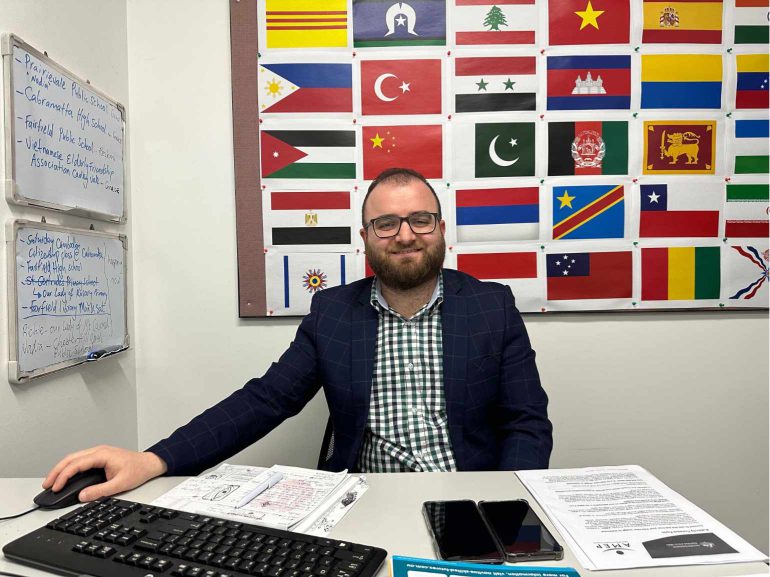
Basim said families who are separated can take much longer to settle, but often find a substitute family through community groups, churches, and places like Navitas Skilled Futures.
“Unfortunately, if people arrive here having left loved ones behind, they are not as ready to settle successfully, because they’re constantly thinking about their family members and their loved ones and worrying if they are safe, if they have food, if they have enough to pay for rent or electricity,” he said.
“But if they come as a family, they will support each other, financially, emotionally, mentally. And when it comes to basic daily needs, like doing the shopping or paying bills or making an appointment with a doctor, family members will often help each other. I used to interpret for my dad, make appointments for my family, fill out forms for them – it made it easier for everyone.”
Basim said for refugees who arrive alone, Navitas Skilled Futures often becomes “that missing link” that helps them feel supported and part of the community.
“We become like a family to them, making them feel welcome from the moment they walk in the door. This extended community gives them that same sense of security, familiarity, understanding and acceptance that you get from family. And over time they make friends, and build confidence and independence to be able to integrate into the wider community.”
Basim Shamaon, NSF Stakeholder Engagement Manager
“Even families that come here together – they might start in the same class and sit together in breaks, but over time they move to their own class, make their own friends, and it is all part of feeling at home.”
CELEBRATING REFUGEE WEEK
During Refugee Week NSF students will celebrate by sharing stories, customs and food from their homelands. They will wear traditional costumes to college and talk about the importance of their heritage.
“At Navitas we encourage people to be proud of being refugees,” Basim said. “It’s nothing to be embarrassed or ashamed of, or scared to share with others. It’s an excellent week in the calendar to remind us that although we are all Australians, we also have this cultural background which we are proud of, and which helps make Australia so unique. Through food, through dance, through language exchange, through traditional costumes, we can take this opportunity in Refugee Week to share our stories in a positive and inclusive way with others.”
